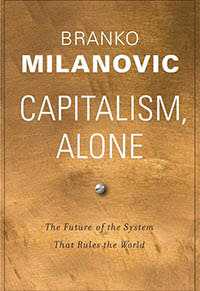The emerging competition between American and Chinese models of capitalism, the problem of inequality in developed societies, and the cultural contradictions of meritocracy, were the focus of The American Interest’s Damir Marusic and Aaron Sibarium’s recent conversation with Branko  to discuss his new book, Capitalism, Alone.
to discuss his new book, Capitalism, Alone.
If you take a snapshot on any day in India, you may have 10 rebellions, but the system itself is not fragile, Milanovic said:
Because it’s democratic, it can accommodate all these different interests. By contrast, China might be fragile because it has a very centralized system. It hasn’t solved the problem of succession. This is really not a small issue—it has brought empires down. Genghis Khan didn’t have a solution to the problem of succession, then the empire disappeared after two generations. So I think that’s a big issue. RTWT
In confronting India’s staggering diversity, the framers of its Constitution sought to shape an overarching Indian identity even as they acknowledged the reality of pluralism by guaranteeing fundamental rights, in some cases through specific provisions for the protection of minorities, Robert L. Hardgrave Jr. wrote for the NED’s Journal of Democracy.







